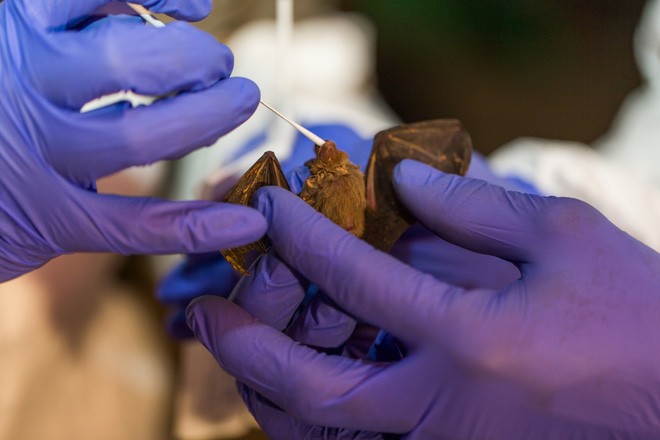Scientists have discovered six new strains of corona virus in bat populations in Myanmar
While the world is coping with the COVID-19 pandemic caused by the SARS-CoV-2 virus strain, scientists say they have discovered six entirely new corona virus strains lurking in bat populations. in Myanmar.
The research, published in PLOS ONE, is part of the PREDICT project, a multinational effort coordinated by the United States Agency for International Development, to detect early pathogens. on animals that have the potential to affect human health.
The optimistic sign from this study is that all 6 newly discovered corona virus strains in Myanmar are infectious only on bats. The scientists said their genomes are not very similar to SARS-CoV-2 or two previously severe human coronavirus viruses, SARS and MERS.

The PREDICT project in Myanmar was implemented from 2016 to 2018. During that time, scientists collected hundreds of saliva samples and droppings from 464 bats of at least 11 different species. They took samples at three locations in Myanmar, where people have close contact with wildlife.
Urbanization and cultivation have led the people here to have more contact with bats, such as some farmers who still use bat manure to fertilize their fields. "Two of these sites also have famous cave systems, where people are constantly exposed to bats through manure harvesting, religious practices and ecotourism," the researchers wrote in research.
Human-wildlife contacts pose a potential risk for the virus to spread from bats to humans, and then mutate to potentially spread from person to person. Many studies have also shown that bats and rodents such as mice are the most potential reservoirs of viruses to cause human pandemics in the future.
That's because bats are the only flying mammals that can spread the disease to a community of bats, animals that have their bloodsucking, and people across a wide area. Mice, on the other hand, may have adapted to thrive in human urban environments.
Scientists are also suspecting that the main strain of SARS-CoV-2 virus causing the current COVID-19 pandemic also originates from bats. It has spread to an intermediary animal, possibly pangolin, before it spreads to humans.
PREDICT project in Myanmar
That's why PREDICT was designed to find potential pathogens before they infect us. In Myanmar, scientists analyzed the genetic sequence of the viruses they found in saliva and bat droppings.
After comparing all the genomes of known corona virus strains, they discovered 6 new virus strains in 3 species of bats: Asiatic yellow house bat (Scotophilus Heathii) carrying PREDICT-CoV-90 virus, wrinkled lip bat. the drop tail (Chaerephon plicatus) carries PREDICT-CoV-47 and -82 viruses, and Horsfield's leaf-bat bat (Hipposideros larvatus) is the host of PREDICT-CoV-92, -93 and -96 virus.
The researchers say they need to do some more research to predict the potential of these six strains of corona virus, predicting whether they can cross-spread to other species including humans.
" Many strains of corona virus may not be dangerous to humans, but when we identify these diseases early in animals, at their roots, we have a valuable opportunity to investigate potential threats." ", co-author of the study, Suzan Murray, director of Smithsonian's Global Health Program, said in a statement.
"Monitoring, research and education are the best tools we have on hand to prevent pandemics before they happen."
And it is now an urgent fact, many years ago, billionaire Bill Gates and many epidemiologists have warned the world is not prepared so too vulnerable to biological threats. The fact that the COVID-19 pandemic is happening unfortunately has proven to be true.

As humans increasingly invade animal habitats, through activities such as hunting and consumption of wildlife, urbanization and destruction of their habitats, animals will increasingly have the opportunity. more interferes with our environment, enabling virus called zoonotic strains to cross from animals to humans.
" Around the world, people are interacting with wildlife with increasing frequency , " said Marc Valitutto, a former veterinarian of the Smithsonian's Global Health Program.
" So the more we have to understand these virus strains in animals and the more we understand - what allows them to mutate and how they spread to other species - the more we have a chance to stop them. stop pandemics before they happen ".
PREDICT, an initiative of the United States Agency for International Development is now helping us do that. This project was established in 2009 and is currently being implemented in more than 30 countries worldwide.
In Vietnam, PREDICT was implemented in cooperation with the National Institute of Hygiene and Epidemiology (NIHE). Since 2016, at least two studies have been conducted in Hanoi, Dong Nai and Bac Giang to monitor human exposure to livestock and wildlife, and to assess the risk of infection. Cross virus from animal to human.
You should read it
- ★ Why do bats harbor many viruses in themselves and survive?
- ★ The US FDA is experimenting with treatment of Covid-19 with anti-malarial drugs and human cures
- ★ France successfully tested anti-malarial drugs combined with antibiotics to treat Covid-19
- ★ Video: Experience of the first person in the world to be tested on Covid-19 vaccine
- ★ Prestigious research completely rejects the conspiracy theory that Covid-19 is a 'born from the laboratory' biological weapon.